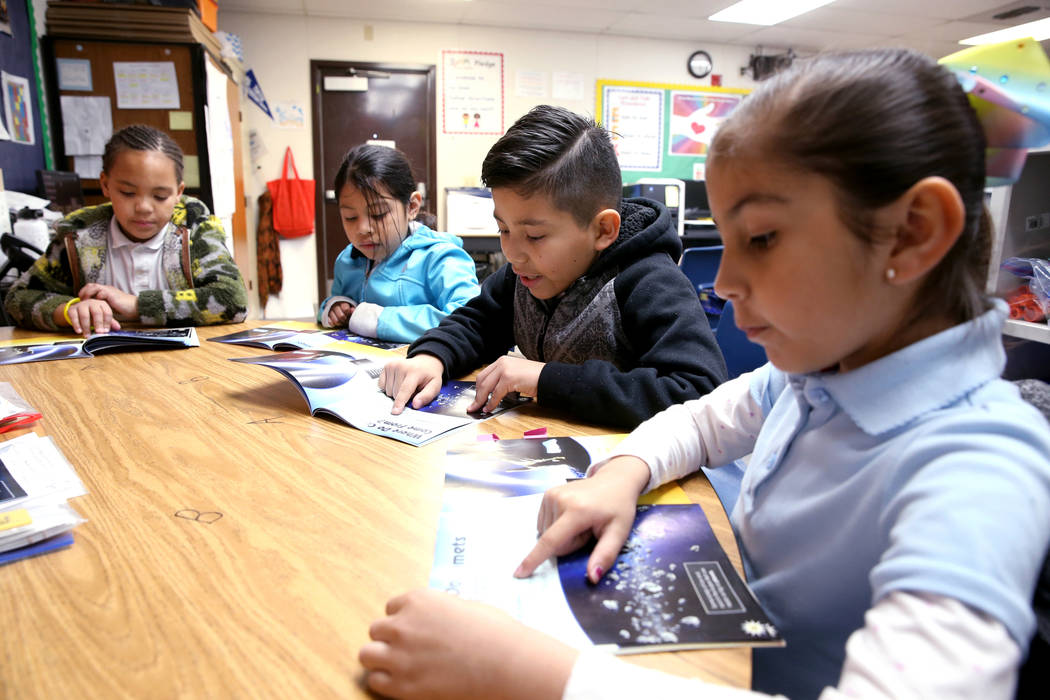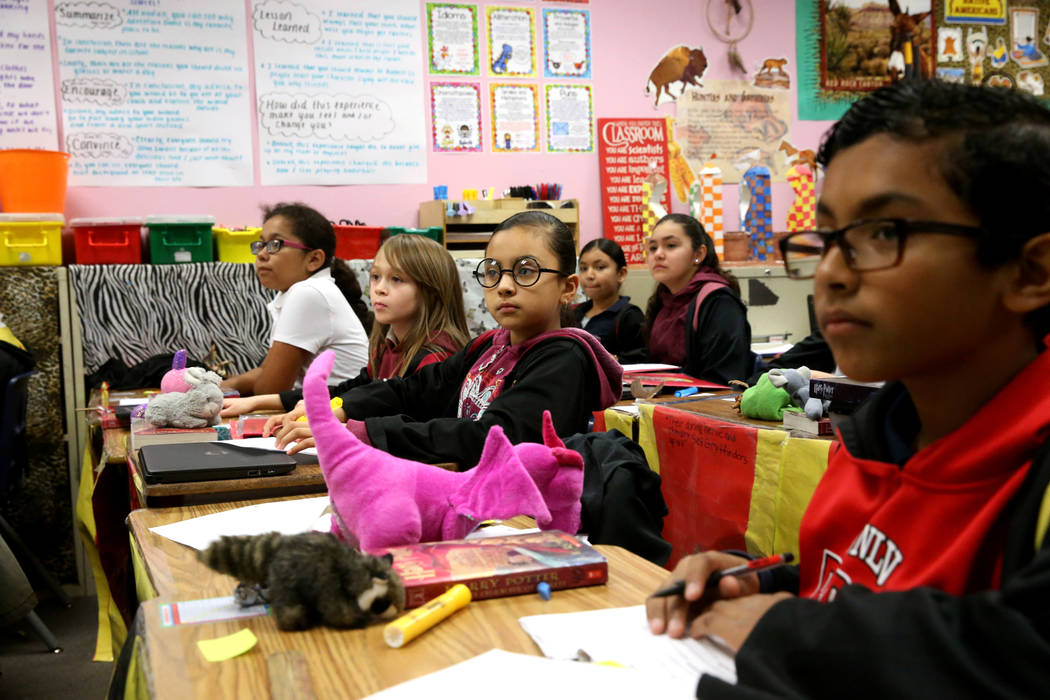Education funding a hot topic as Nevada Legislature set to begin


The signatures are collected. Unions and school districts are on board. Parents are becoming informed.
Now, as lawmakers convene in the capital, the question arises: will the Nevada Legislature heed the rallying cry to increase education funding?
A bill proposed by Sen. Mo Denis, D-Las Vegas, hopes to start on that path.
But when it comes to change — and money — in the Silver State, such a plan will likely unroll slowly.
Nevada should be spending $9,238 per student, according to a 2018 study commissioned by the Legislature. That’s more than the $6,052 per-pupil amount for 2020 proposed in Gov. Steve Sisolak’s budget and the current average of $5,897 per pupil.
On top of that, the study recommended adding more money for students with certain needs — an amount determined by a fractional weight.
Ideally — and to be at least adequate — that would mean an additional $2,771 for at-risk or low-income students, $4,619 for English learners and $10,162 for special education students.
Yet researchers acknowledged that’s a stretch, and proposed alternative plans with a base of $5,988 per student.
Denis’ bill aims to expand upon such weighted student funding, which was passed in the last session with a plethora of caveats.
He said his bill will feature student-centered funding that anticipates the needs of school districts, rather than drawing figures based on the previous year’s statistics.
But the proposal isn’t about raising more money, Denis said — it’s about how to allocate it.
“The replacement of the Nevada Plan is a discussion about policy — how do we allocate the money,” he said. “It’s not a discussion about how much money. So that bill is not looking to increase or decrease (funding).”
The governor is also ready to change the 52-year-old Nevada Plan, proposing nearly double additional funds for English language learners, special education and low-income students.
The boost from $72 million to $139.8 million would increase the number of students served from 30,000 to 58,250.
That’s a significant expansion of weighted funds, which currently come with a number of caveats: students must be in the bottom 25 percent on state tests, be an English language learner or low-income and not attend a Victory or Zoom school that already receives extra funds.
“I look forward to working with the legislature to review the decades-old Nevada Plan to ensure that tax dollars for education follow the student,” Sisolak said in a statement. “Our statewide funding formula needs to be equitable for every student in every county in Nevada.”
But working out a solution will require the support of both rural and urban districts alike.
The initiative has rural lawmakers concerned that school districts in their areas may lose funding — particularly after the Elko County School District predicted losing money.
“If they get hit with a 20 percent change, I don’t know what they’ll do,” said Assemblyman John Ellison, R-Elko. “It’s going to work fine to change the formula for Clark, but you got 15 counties out here that it might be a whole different ballgame.”
It’s perhaps one of the biggest education-related issues for an upcoming legislative session that will have education once again at the forefront.
Safety and salary

Sisolak, meanwhile, has proposed pouring $76.2 million into school safety — the majority of which will come from the 10 percent retail tax on marijuana.
The proposal comes after public outcry over those funds, which were ultimately sent into the rainy day fund after a political battle in the last legislative session over school choice.
The funding would grow the number of behavioral health specialists in schools from 119 in the spring of 2016 to 353, according to state data.
It would also boost school police officers, adding 30 in the first year and 40 the next — welcome news for the Clark County School District Police Officers Association.
“We definitely need officers, and if they can take money they already have and use that for a good cause, I think that’s the way to go,” said Matt Caldwell, president of the association.
The new school safety account will also fund threat assessments and training for rural districts and the creation of a five-year strategic plan on social, emotional and academic development.
It also requires the governor to appoint a statewide school safety committee and requires principals to establish plans for restorative discipline rather than the more harsh progressive discipline.
Sisolak is also proposing that educators get a 3 percent cost-of-living increase at a cost of $89.4 million in fiscal year 2020 and $91.2 million in 2021.
The governor has not specified where exactly that money is coming from, but he wants to retain the state’s modified business tax and part of the governmental services tax, which could generate millions more in funding.
“My budget is a balanced one, and all funding proposed comes from funding already available,” Sisolak said. “Initiatives like the pay raise for teachers and increased reimbursement for classroom supplies will come through the general fund.”
Other legislation
Other planned education-related bills include the creation of a prekindergarten account that will award funding to school districts for early childhood education.
The Department of Education, which sponsored the bill, would administer the money through a competitive grant process. The account would be located in the state’s general fund.
Another bill from the department creates a new kind of charter school under the Achievement School District initiative known as an “A+” achievement charter. In this unique setup, the school district remains the employer of the staff at an A+ achievement charter, which is tapped for the achievement district due to low performance.
An independent administrator, selected by the executive director of the achievement district, then appoints the school’s governing body and principal.
The department declined to comment on the bills, citing the governor’s office review of all bill draft submitted prior to Sisolak’s time in office.
Lawmakers are also once again proposing cameras in certain special education classrooms — a proposal that died in the 2017 legislative session.
The bill rose out of concern from parents of special education children who could not describe what was happening in classrooms.
The Clark County School District has recently agreed to settle a lawsuit over one special education teacher’s alleged verbal and physical abuse of students that occurred in 2015.
The $1.2 million settlement, which will include more money for attorney’s fees, has yet to be approved by the School Board.
Sen. Scott Hammond, R-Las Vegas, a sponsor of the camera bill, said it will protect both the students, teachers and the schools. It also informs parents about the best methods for teaching their child.
“They can see if it’s working or not so they can make better decisions when it comes to sitting down and talking about their (individualized education program),” he said.
Contact Amelia Pak-Harvey at apak-harvey@reviewjournal.com or 702-383-4630. Follow @AmeliaPakHarvey on Twitter.













